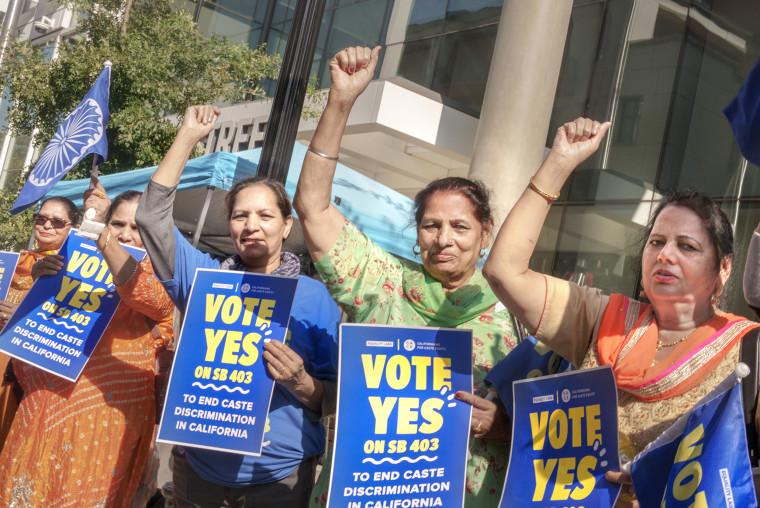Nirmal Singh, 42, has been on a hunger strike for 18 days. Only drinking liquids, he says he can’t run with his children anymore; even climbing stairs is hard. But as an Indian American who identifies as caste-oppressed, he says the cause he’s fighting for is worth it.
In an effort to make California the first state in the United States to ban caste discrimination, a group of South Asian activists has been on a hunger strike for more than two weeks outside Gov. Gavin Newsom’s office.
They say they will not eat solid foods until Newsom signs Senate Bill 403, which would explicitly clarify that caste is among the protected category of ancestry in California’s civil rights law.
The bill, which cleared both houses of the state Legislature earlier this month, has signaled a large step forward for caste oppressed Americans, leaders said. To make one last push to get it signed by the governor before his deadline of Oct. 14, they say they’re turning to a quintessentially South Asian practice.
“Fasting has a very sacred purpose in multiple religious traditions in our community,” Thenmozhi Soundararajan, a caste equity activist and founder of the civil rights organization Equality Labs, told NBC News. “And there’s nothing more sacred than the pursuit of dignity and freedom and healing.
Newsom’s office told NBC News that the governor doesn’t comment on pending legislation.
The caste system, a social hierarchy most prominent in South Asian communities, relegates some into lower classes where they face violence, slurs, social isolation and a lack of mobility. Caste oppressed people, sometimes called Dalits, say those barriers have followed them even after immigration to the U.S.
Three core strikers have been fasting for the past 18 days, with dozens of others joining them for different stretches of time. Their numbers vary between a dozen and 250 depending on the day, Soundararajan said.
Singh is one of the protesters who has been fasting for the duration. As a physician and father of young children, he’s exhausted, but having experienced casteism himself, he wants to keep fighting.
“This system is an inhumane system, it’s psychological and mental trauma,” he said. “As the father of two wonderful girls, it becomes very important for me to do my best to create an environment for them which is safe, and which is conducive to their personal growth … I want to leave for them a safe California.”
Singh says he has faced social isolation and snide comments from some caste-dominant Indian Americans. He says he hopes his daughters never have to experience what he has gone through.
Standing outside with signs, chants and songs for several hours of the day, the protesters have been consuming an all-liquid diet and keeping their vitals monitored throughout the process.
“It’s to show how committed we are to our civil rights bill,” Singh said. “This is a unifying force for the caste-oppressed, as well as progressive caste-dominant people … We are together in this.”
But SB 403 has been controversial among Indian Americans, many of whom say bringing up caste unfairly targets them, and that the governor should veto it.
“SB-403 unfairly maligns, targets and racially profiles select communities on the basis of their national origin, ethnicity and ancestry for disparate treatment, thereby violating the very laws it seeks to amend,” the nonprofit Hindu American Foundation wrote in a letter to state senator and bill author Aisha Wahab earlier this year. “Additionally, this language also unfairly assigns or institutionalizes a presumptive status of ‘oppressor’ to all South Asians who do not identify as or are not perceived as Dalit or Adivas.”
But Soundararajan disagrees, saying conversations and legislation around caste need to happen in order to protect the most vulnerable members of the community.
“This is, again, one of the reasons why we’re doing this hunger strike is that we need to remind our community there’s another path forward from polarization and bigotry,” she said.
Those striking say they’re exhausted and hungry, but that their goal makes it worthwhile.
“I really do miss food,” she said. “I think about how I wish I had a paratha, but I’m also hungry for freedom. And that hunger for freedom outweighs whatever minimal desire for food is in the present.”

